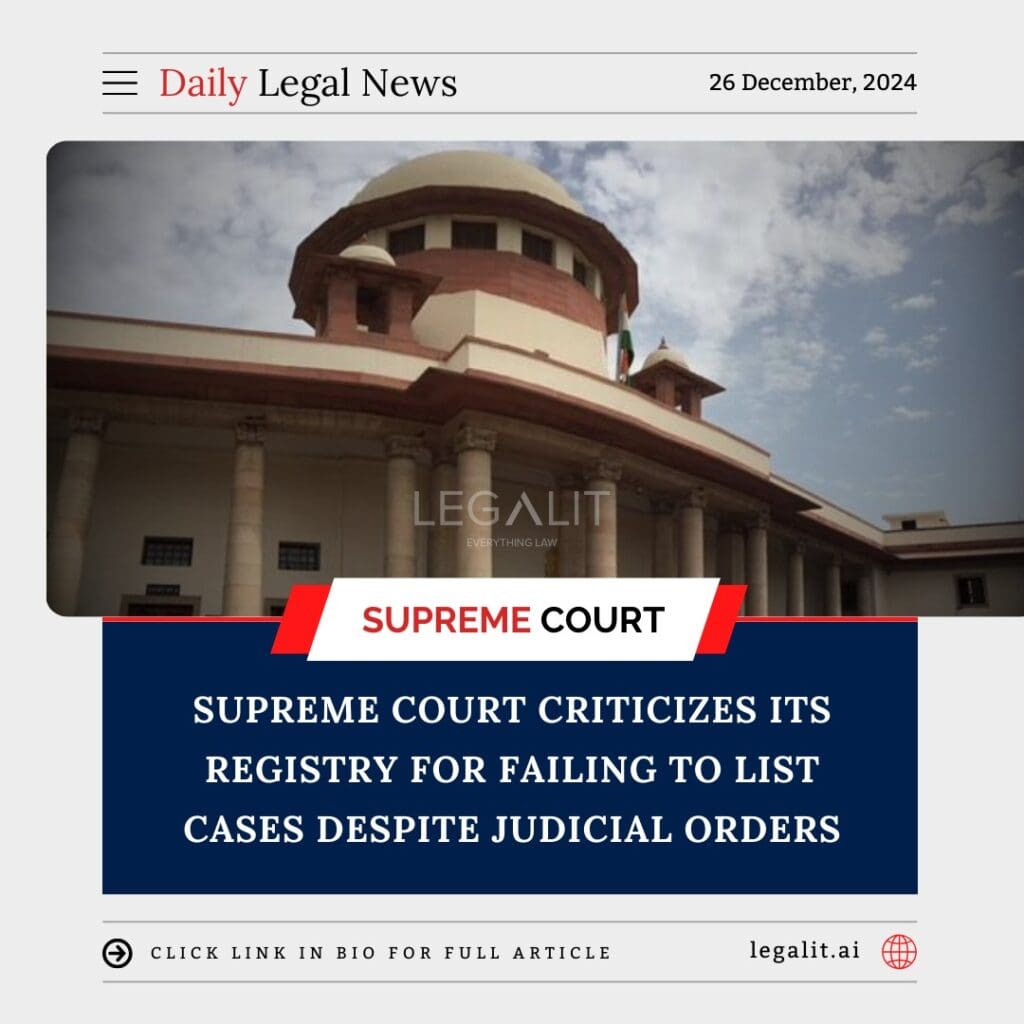
The Supreme Court of India has expressed strong discontent over the failure of its registry to list cases despite specific judicial orders. The court’s remarks came in a case where the petitioner’s case, which was directed to be listed by earlier orders, was not included in the cause list as scheduled. This incident has sparked concerns over the procedural inefficiency and administrative oversight within the registry, with the apex court emphasizing the need for accountability in its functioning.
Background
The issue came to light during a hearing in which a petitioner raised the concern that despite the Supreme Court’s order to list their case on a particular date, the case had not been included in the cause list. This led to unnecessary delays and left the petitioners without recourse. The case, which involved a pressing legal issue, had been pending for a considerable period, and the failure to list it on time further exacerbated the situation.
The petitioner’s counsel informed the bench that the matter was of urgent nature and had already been scheduled for hearing by the court, but for some reason, it was not listed on the scheduled date. This prompted the bench to ask the registry to explain why judicial orders were not being followed and why the cases were not being listed promptly.
Key Arguments
Supreme Court’s Criticism
- Administrative Oversight: The Supreme Court bench questioned the inefficiency in the registry’s handling of case listings, particularly when clear judicial orders were given. The court expressed frustration over the delay in the process, which resulted in a significant inconvenience to the parties involved.
- Failure to Follow Judicial Directions: The bench highlighted that the registry’s failure to follow judicial orders undermines the court’s authority and affects the timely administration of justice. The failure to list cases as directed by the court undermines the purpose of the judicial process and disrupts the court’s functioning.
- Need for Accountability: The bench stressed the importance of holding the registry accountable for such administrative lapses. The court emphasized that the registry should be more responsive to its directions, especially in cases involving time-sensitive matters.
Registry’s Defense
- Administrative Issues: In response, the registry may have pointed to certain administrative challenges or staffing issues that led to the failure in listing the case on time. However, the court made it clear that such excuses were not acceptable, given the significant implications for the parties involved and the justice system as a whole.
- Volume of Cases: The registry might argue that the sheer volume of cases it deals with could lead to occasional delays. However, the court rejected this as an adequate justification, emphasizing that judicial orders should take precedence in all circumstances.
Court’s Observations
The Supreme Court emphasized that it is critical for the registry to adhere to timelines set by the court, as any delay can have a cascading effect on the justice delivery system. The bench observed that the court’s orders should be respected and followed, and that the registry’s failure to comply with these directions amounted to a serious breach of protocol.
The court also pointed out that administrative inefficiencies can erode the public’s faith in the judicial system, especially when it comes to timely justice. It was stressed that the judiciary’s credibility depends not only on the delivery of substantive justice but also on the procedural integrity maintained by the registry and other administrative bodies involved in the judicial process.
Legal and Policy Implications
Ensuring Efficient Case Management
The Supreme Court’s criticism of its registry highlights the pressing need for more efficient case management and administrative processes within the judicial system. It calls for the implementation of reforms aimed at ensuring that judicial directions are adhered to promptly and consistently, so that the public’s access to justice is not hindered by administrative delays.
Judicial Reforms and Accountability
This incident also underscores the need for a stronger framework of accountability within the judicial administration, particularly within the Supreme Court’s registry. The failure to list cases as per judicial orders raises important questions about the internal functioning of the court and the need for judicial reforms to streamline administrative tasks and prevent such lapses.
Impact on Public Confidence
The court’s decision to call out its registry for these failures reflects the broader concerns regarding public confidence in the judicial process. When procedural delays occur, it can result in frustration for litigants and a loss of trust in the judiciary’s ability to deliver timely justice. Therefore, the court’s remarks serve as a timely reminder of the importance of maintaining procedural discipline and ensuring that administrative operations align with the judicial process.
Conclusion
The Supreme Court’s criticism of its registry for failing to list cases despite judicial orders highlights significant concerns regarding the efficiency and accountability of the judicial administration. The incident serves as a stark reminder of the need for systematic improvements in case management and administrative processes within the judiciary. Moving forward, it is crucial for the registry to take necessary steps to prevent such lapses and ensure that the court’s orders are followed meticulously to uphold the integrity of the justice system. This case reinforces the importance of procedural compliance in maintaining public confidence and ensuring the timely administration of justice in the country.